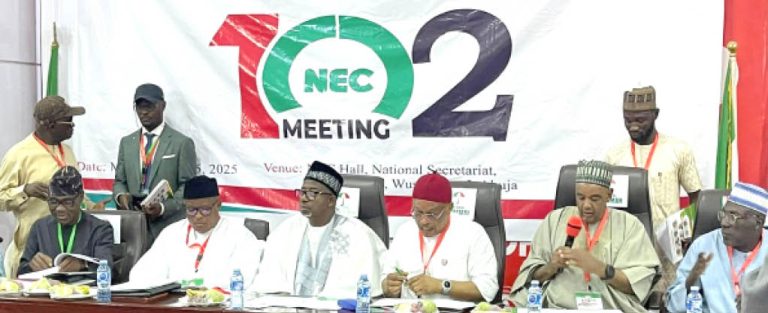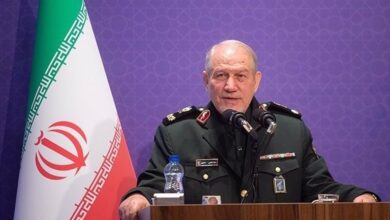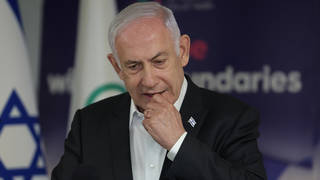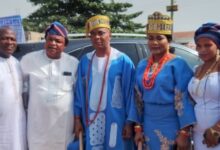Big risk as PDP moves against North, zones presidency to South
*Tinubu, APC and PDP possible victims - Analyst *Zoning presidency to south a big error for PDP - Olawepo-Hashim *Building our party structures across Nigeria more important to us than zoning, says ADC's Bolaji Abdullahi

By KEMI KASUMU, ADEWALE Mohammed, OUR REPORTERS, Abuja and Lagos
“Unlike other parties, we have a lot of work to do to build our structures across the country. That is more important to us than conversations about where the president will come from.”
Nigeria’s erstwhile main opposition Peoples Democratic Party (PDP) may have taken what watchers of events ahead of 2027 general elections in the country call big risk by its daring decision zoning its 2027 presidential ticket to the South, thereby thus ending the chances of the Arewa side to produce the next president of the country through its platform.
The decision of the PDP comes amidst complicated crisis rocking its credibility to be trusted by Nigerians home and abroad, having watched a former governor from the South drag it for too long like the uncheckable Hiltler in a way that not many citizens believe what the umbrella party is doing currently is helping decide votes in favour President Bola Ahmed Tinubu to the disfavour of the growing opposition coalition’s African Democratic Congress (ADC) ahead of time.
The decision was reached, among other resolutions, at the party’s 102nd National Executive Committee (NEC) meeting held at its national headquarters in Abuja on Monday.
The DEFENDER reports that the NEC meeting also confirmed Ambassador Umar Damagum as the party’s Substantive National Chairman. He is to hold the position until the party’s elective national convention in Ibadan scheduled for November 15 and 16.
The decision of the party to zone its presidential ticket to the South mirrored a similar path taken by the ruling All Progressives Congress (APC), whose governors, National Working Committee (NWC), and National Assembly caucus have already adopted President Bola Ahmed Tinubu as its sole candidate for 2027.
If either Tinubu or a southern candidate of the PDP wins the 2027 election, by 2031 the South would have governed Nigeria for a cumulative 21 years since the return to democracy in 1999: Olusegun Obasanjo (1999–2007), Goodluck Jonathan (2010–2015), and Tinubu or another southern president (2023–2031).
In contrast, the North would have held power for only 11 years within the same period: Umaru Musa Yar’adua (2007–2010) and Muhammadu Buhari (2015–2023), thus making untrue the claim of some Southern elements especially in South West that the North controls Nigeria. “Hardly has any saner person believed that the North that controls Nigeria has been unable to rule the country more than the South. No be jyhu be that?” A public affairs analyst retorted in response to our reporter in Abuja.
According to him, “Whatever anybody likes let him say or do, power is going back to the North come 2027. Take it or leave it but we are always not selfish. Even those who are unfairly misinforming public discourse against the North over the issue of national leadership know this truth. Is it the North that asked Tinubu not to rule Nigeria well? Is it the North that push him to go and start causing crisis in opposition parties so no party will be credible and strong enough to challenge him in 2027?
“Look, if you do well in your first term, you don’t need to scatter any opposition organisation to have your way I to the second term. This is what Tinubu does not know, despite being idolized as master strategist, and that is the truth his deceivers brandishing his cap symbol around are not letting him realise.
“In all, the victims of the PDP zoning will be Tinubu, himself, APC and the PDP. Let’s watch the game as it unfolds,” he explained.
According to a media report, zoning has remained a central factor in Nigeria’s presidential contests, with major parties, including the APC, rotating the position between regions. Political players however point out that it is not written anywhere in the Constitution that leadership of the country be rotational.
Multiple PDP sources have reportedly said that the party’s decision was primarily to reduce acrimony. Another insider added that the zoning arrangement would also discourage current NWC members from seeking re-election to their positions.
A NEC member explained, “NEC zoned the presidency to the South because the national chairman and presidential candidate cannot ordinarily come from the same region. All stakeholders had already agreed to maintain the status quo on zoning. Besides, after eight years of President Muhammadu Buhari, it would not be fair to zone the presidency to the North.
“Even the body language of Nigerians favours a southern presidency, and the party is taking cognisance of the situation in the country,” he said.
Ahead of the 2023 general election, the PDP had set up a zoning committee led by former Benue State governor Samuel Ortom. After wide consultations, the Ortom committee threw the ticket open, allowing aspirants from across the country to contest.
That decision produced former Vice President Atiku Abubakar as candidate, a move that polarised the party. The fallout led to the formation of the G-5 governors, led by then Rivers State governor, now FCT Minister, Nyesom Wike, who opposed Atiku’s candidacy and worked against the PDP during the election. The group included Oyo’s Seyi Makinde, Ortom, Abia’s Okezie Ikpeazu, and Enugu’s Ifeanyi Ugwuanyi.
To address lingering divisions, the NWC on August 14 inaugurated another zoning committee chaired by Bayelsa State governor Douye Diri. The committee’s recommendations, later adopted by NEC, led to Monday’s resolution zoning the presidency to the South.
Meanwhile, a PDP chieftain, Gbenga Olawepo-Hashim, has described the zoning of the 2027 presidential ticket to the South as a “default campaign” for President Tinubu’s re-election under the APC.
Olawepo-Hashim, who is from the North Central and has declared interest in seeking the party’s ticket, argued that the South lacked a viable candidate capable of challenging Tinubu, accusing those who supported the decision of indirectly working for the president’s second term.
“This is a subtle campaign for an easy ride for President Bola Ahmed Tinubu. Those who are saying it must be automatically zoned to the South are also championing the president’s re-election. They are running a default campaign for his re-election,” he said.
He further claimed that zoning elective positions violated the Nigerian constitution and disenfranchised party members.
“I believe NEC has made a big error. Yes, it was democratic in the sense that members voted, but it was still a mistake because the Nigerian constitution does not allow you to discriminate against a party member seeking elective office on account of where he comes from. It is a major constitutional issue. Even though I was not contesting, any party member can go to court and say, ‘I was shut out by this zoning policy,’” he argued.
Describing the decision as unprecedented, Olawepo-Hashim said the PDP had never barred any zone from contesting the presidency.
“The PDP has never zoned the presidency before. The party never shut the door against any zone. What has happened today is unprecedented,” he said.
He also dismissed comments by FCT Minister Nyesom Wike, who claimed the zoning vindicated him. Olawepo-Hashim said Wike should not be taken seriously, alleging that he was among those campaigning for Tinubu’s re-election.
But one of the founding fathers and member of the PDP Board of Trustees, Chief Ejiofor Onyia, described the decision to zone the 2027 presidential ticket to the South as a crucial step toward restoring unity and repositioning the party ahead of the general elections.
Speaking on Arise TV, Onyia said the outcome of NEC meeting had eased lingering disputes within the opposition.
“We are now exiting our time of squabbling and the party is coming back together to serve the nation the way we have served it before,” he said.
Onyia explained that the zoning committee had concluded its work, paving the way for the Southern states to micro-zone the presidential slot, while existing National Working Committee (NWC) offices would remain unchanged.
Other stakeholders at the NEC meeting
The BoT member acknowledged that past constitutional amendments had worsened internal crises, particularly when the mandatory resignation clause for officeholders seeking elective posts was diluted.
“What was stated clearly was that before any candidate holding a party office goes for elective office, that candidate must resign. But as amendments were being done, the wordings were changed from ‘shall’ to ‘may,’ and that created the initial misunderstanding,” he explained.
Onyia said NEC had opted for reconciliation rather than punishment of members accused of anti-party activities, including the G-5 governors.
“It’s not time to wield the big stick yet. When people are contrite, you allow them. This is a political environment, not a school where you punish according to offense,” he said, adding that most of the dissenting governors had returned to the fold.
He dismissed claims that FCT Minister Nyesom Wike could dictate PDP affairs from outside.
“As of today, the FCT Minister is working for an opposition party and he does not have the power to decide what the party does. He can react any way he likes as an individual, but that does not stop the party from doing what the constitution has provided,” Onyia said.
He dismissed suggestions that new parties could overtake PDP before 2027.
“PDP is in every ward of this country, every local government. It will take ADC a minimum of four years to build the kind of structure PDP has. There’s no way they can catch up in 2027,” he said.
Since its formation, the PDP has relied on zoning as a power-balancing mechanism.
Ahead of the 1999 primaries, founding leaders adopted zoning to appease the South-West after the annulment of the June 12, 1993 election, believed to have been won by MKO Abiola. The party zoned its ticket to the South-West, eventually producing Obasanjo.
In response, the PDP formally zoned its 1999 presidential ticket to the South, particularly the South-West, as a reconciliatory gesture to appease the region most affected by the June 12 crisis. However, this did not stop aspirants such as Alex Ekwueme (South-East), Abubakar Rimi (North-West), and Sarah Jibril (North-Central) from contesting against the eventual winner, former President Olusegun Obasanjo (South-West).
By 2003, Obasanjo sought re-election. The PDP leadership rallied behind him, though northern figures like Abubakar Rimi still entered the race. The contest, however, was not competitive, as Obasanjo overwhelmingly secured the party’s ticket and later won re-election against Muhammadu Buhari of the ANPP in the general election.
In 2007, the zoning arrangement swung back to the North after Obasanjo completed his two terms. As party leader, Obasanjo played a central role in determining his successor, throwing his weight behind Umaru Musa Yar’adua, then governor of Katsina State (North-West). This endorsement forced other influential aspirants, including Rivers State governor Peter Odili, to withdraw. Rochas Okorocha (South-East), however, refused to step down and finished second with 372 votes, far behind Yar’adua’s over 3,000 votes.
Following Yar’adua’s death in 2010 and the swearing-in of his vice president, Goodluck Jonathan (South-South), the PDP faced one of its most controversial zoning battles ahead of the 2011 presidential election. Many northern leaders, under the umbrella of the Northern Political Leaders Forum (NPLF) led by Adamu Ciroma, argued that the presidency should remain in the North to complete Yar’adua’s term. Jonathan, however, insisted on contesting and, backed by most PDP governors, overwhelmingly defeated Atiku Abubakar (North-East) at the primaries.
After the zoning crisis of 2011, the PDP’s 2015 primaries marked a major departure from its earlier competitive tradition. The party barred serious contestation, adopting Jonathan as the sole presidential candidate. Many considered Jonathan’s decision to run again as a betrayal because of an informal understanding in 2011 that he would serve only one full term before power returned to the North.
Much like the ruling APC did earlier this year with President Tinubu, Jonathan was adopted in 2015 as the consensus candidate of the PDP. His adoption was endorsed by all major organs of the party, including the National Executive Committee (NEC), the Board of Trustees (BoT), the PDP Governors’ Forum, and other stakeholders.
However, the move deepened divisions within the party, prompting the exit of powerful factions to the opposition. The fallout ultimately contributed to Jonathan’s loss in the 2015 general election, making him the first incumbent president in Nigeria’s history to be defeated in a re-election bid.
In the meantime, Mallam Bolaji Abdullahi, National Publicity Secretary of the African Democratic Congress (ADC), has said the party was not currently discussing zoning.
“Unlike other parties, we have a lot of work to do to build our structures across the country,” he told Daily Trust.
He added that “That is more important to us than conversations about where the president will come from.
“So, we are not having that discussion now. When the time comes, it will not be a secret. We will make our position clear, whether we are adopting zoning or not.”
On claims that the ADC is pursuing northern interests, Abdullahi dismissed the suggestion.
“That is not true. We are not going to allow ourselves to be blackmailed by that kind of narrative,” he said. “When the time comes, we will do what is in the best interest of our party and Nigerians.
“Whoever we put forward will be in our best interest, because at the end of the day, we want to win the election. Whatever choices we make will be strategic decisions to help us achieve victory and deliver on our plans for Nigerians. We will not do something simply because that is what other parties are doing.”
On whether competence will take precedence over zoning, he said both could go hand in hand.
“Absolutely. They are not mutually exclusive. To say you are going for zoning does not mean you will not go for competence. What we are saying is that for now, it’s not a conversation we are ready to have as a party.”









